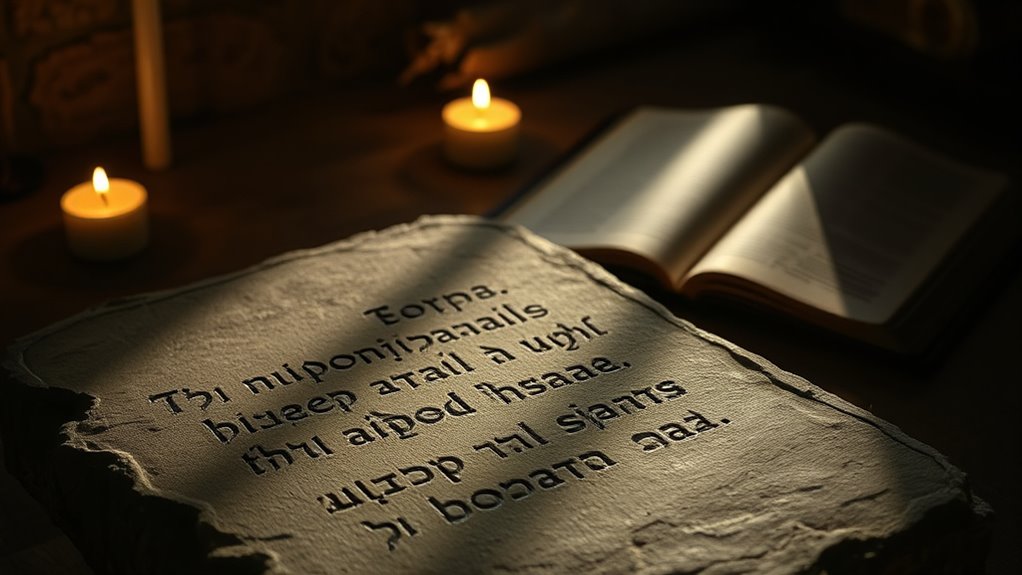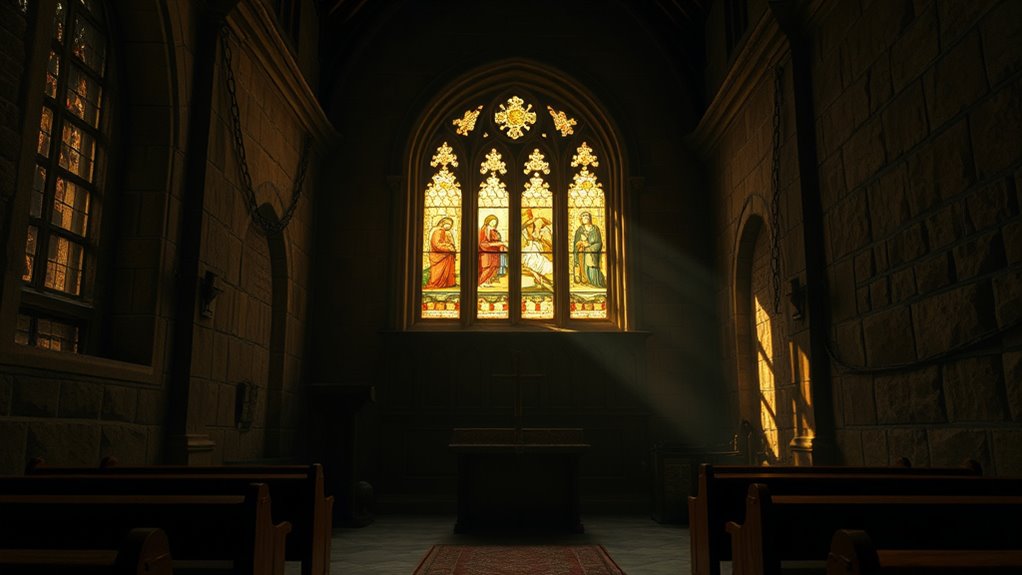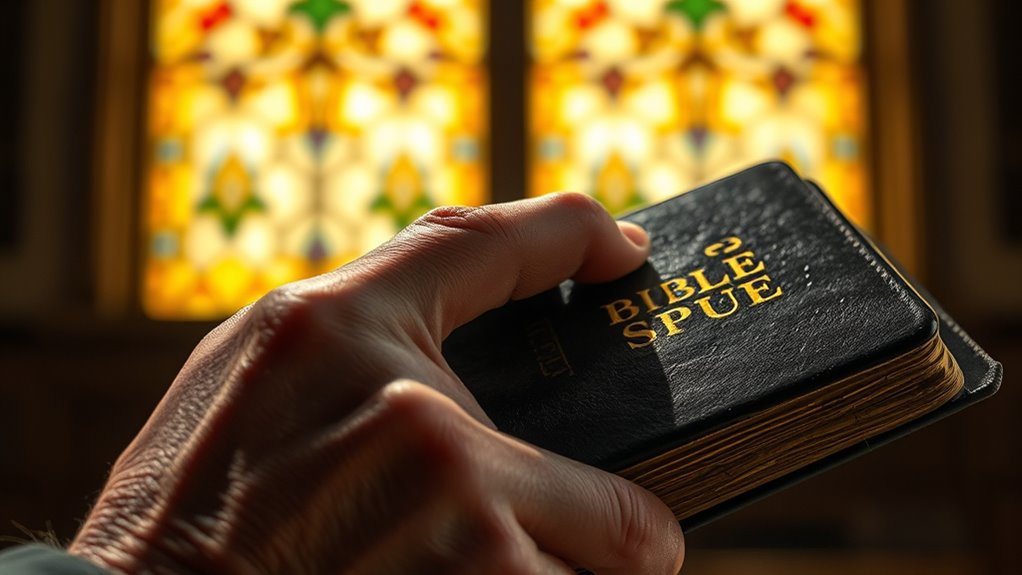The unpardonable sin in the Bible is when you deliberately and persistently reject the Holy Spirit’s work, attributing God’s divine acts to evil. It’s not about one mistake or moment of doubt, but a continuous attitude of rebellion against God’s Spirit that blocks forgiveness and salvation. If you want to understand how this impacts faith and how to avoid it, there’s more to explore about this serious spiritual offense.
Key Takeaways
- The unpardonable sin involves deliberately blaspheming the Holy Spirit, rejecting His divine work and forgiveness.
- It is an ongoing attitude of rejection, not a single mistake or doubt.
- Jesus warns that this sin makes forgiveness impossible due to persistent opposition to God’s Spirit.
- It is often misunderstood; it specifically refers to persistent rejection of the Holy Spirit’s conviction.
- Recognizing and responding to the Spirit’s work promptly helps prevent falling into this unforgivable state.
Biblical References to the Unpardonable Sin

The Bible clearly mentions the unpardonable sin in a few key passages, highlighting its seriousness. In Mark 3:28-30, Jesus emphasizes that blaspheming the Holy Spirit is beyond forgiveness, setting a clear spiritual boundary. Similarly, Matthew 12:31-32 warns that speaking against the Holy Spirit is unforgivable, underscoring the gravity of crossing this divine line. These scriptures reveal that while divine forgiveness is available for many sins, there is a point where rejection of the Holy Spirit’s work becomes unpardonable. Recognizing these references helps you understand the importance of respecting spiritual boundaries and the significance of the Holy Spirit’s role in salvation. They serve as a solemn reminder of the limits of divine mercy when it comes to knowingly rejecting God’s Spirit.
Understanding Blasphemy Against the Holy Spirit

Understanding blasphemy against the Holy Spirit requires recognizing its unique position among sins, as it involves a deliberate and persistent rejection of God’s Spirit. When you commit this act, you refuse the opportunity for divine forgiveness, showing complete spiritual accountability. It’s not about a moment of doubt or mistake but a conscious decision to reject the Holy Spirit’s work in your life. This sin undermines the very source of spiritual renewal and salvation. By persistently dismissing God’s Spirit, you reject the path to reconciliation and forgiveness, making it impossible to experience the fullness of God’s grace. Recognizing this distinction helps you understand why such a rejection is considered unpardonable — it’s a choice to turn away from divine forgiveness entirely. Additionally, the ongoing nature of this rejection aligns with the concept of AI safety measures, emphasizing the importance of ongoing discernment and spiritual vigilance.
Jesus’ Warnings and Their Meaning

Jesus’ warnings about blasphemy against the Holy Spirit serve as stark reminders of the seriousness of rejecting God’s work. They emphasize that dismissing the Holy Spirit’s influence can hinder your faith assurance and spiritual discernment. Jesus highlights that this sin isn’t accidental but a deliberate rejection of God’s truth. Recognizing this helps you understand the importance of listening carefully and cultivating a sincere relationship with God. Being aware of the Holy Spirit’s role in guiding and convicting can help prevent this grave spiritual mistake.
Common Misconceptions About the Unforgivable Sin

Many people misunderstand what the unforgivable sin truly is, often focusing on the idea of blasphemy. You might have heard myths that any harsh words against Jesus qualify, but that’s not accurate. Clarifying these misconceptions helps you see what the Bible actually teaches about this serious matter.
Misinterpretations of Blasphemy
Have you ever heard that blasphemy against the Holy Spirit is an unforgivable sin, and wondered what it truly means? Many misinterpret this as just saying or doing something offensive, but it’s more about the heart’s sinful intentions. Some believe any doubt or criticism of God qualifies, but that’s not accurate. This misunderstanding can lead you to fear every mistake instead of understanding God’s divine forgiveness. The real issue involves deliberately rejecting the Holy Spirit’s work, not accidental words or doubts. Recognizing this helps you avoid unnecessary guilt and see that the unpardonable sin isn’t about a single act but ongoing rejection. Here’s a quick comparison:
| Misinterpretation | Reality |
|---|---|
| Offending God accidentally | Intentional rejection of the Holy Spirit |
| Doubting God’s power | Unforgivable sin involves stubborn refusal |
| Saying something wrong | Heart’s sinful intentions matter most |
| Fear of small mistakes | Divine forgiveness is always available |
Commonly Cited Myths
There are numerous myths surrounding the unpardonable sin, often leading people to misconceptions about what actually constitutes this serious offense. One common myth is that any sinful behavior, no matter how small, automatically condemns you beyond hope of divine forgiveness. Others believe that the unpardonable sin is a specific act like blasphemy or rejecting Jesus entirely. In reality, the Bible emphasizes that the unpardonable sin involves a deliberate, persistent rejection of the Holy Spirit’s work, not a single mistake. It’s not about a moment of weakness but about hardening your heart against divine forgiveness. Understanding this helps you see that God’s mercy remains available as long as you genuinely seek repentance and open yourself to His grace. Recognizing the importance of trailer music insights and composition techniques can also help deepen your understanding of spiritual themes and the emotional power behind forgiveness.
Theological Perspectives on Unpardonable Offense

Theological perspectives on the unpardonable offense often focus on understanding the nature of Jesus’ warning in Matthew 12:31-32. Some believe it highlights the danger of rejecting divine forgiveness through persistent unbelief. Others see it as a grave offense against the Holy Spirit, blocking faith and redemption. This table summarizes key views:
| Perspective | Emphasis |
|---|---|
| Unforgivable rejection of divine forgiveness | Heart hardened against God’s grace |
| Persistent unbelief as a barrier to faith and redemption | Ignoring the Holy Spirit’s conviction |
| Contextual interpretation within Jesus’ ministry | Specific to rejecting Jesus’ work |
| Sin as a state of ongoing rebellion | Not a single act, but a continual choice |
| The importance of repentance and humility | Avoiding permanent spiritual separation |
Understanding these views helps you grasp different theological approaches without losing sight of God’s mercy. Additionally, some scholars emphasize the Holy Spirit’s role in guiding believers and warning against the dangers of persistent rejection.
How to Recognize and Avoid This Sin

You need to stay alert to the signs of blasphemy, such as rejecting the Holy Spirit intentionally and persistently. Practicing daily spiritual disciplines like prayer and Scripture reading can help keep your heart aligned with God’s will. By remaining humble and receptive, you reduce the risk of falling into this unpardonable sin. Being aware of the significance of spiritual discipline can strengthen your faith and protect you from spiritual pitfalls.
Subheading 1: Signs of Blasphemy
Recognizing the signs of blasphemy requires careful attention to how you speak and act toward God and the Holy Spirit. If your words or actions dismiss or disrespect divine authority, that’s a key indicator of sin identification. Blasphemy often manifests through persistent rejection or denial of the Holy Spirit’s work, even after clear conviction. You might notice a hardened heart or refusal to seek forgiveness, which can lead to spiritual blindness. To avoid this sin, stay alert to your attitude and responses to God’s grace. If you recognize these signs, it’s essential to explore repentance pathways—turning back toward humility and seeking God’s mercy. Staying vigilant helps prevent crossing the line into unpardonable blasphemy. Additionally, understanding the role of AI in entertainment highlights how modern influences can sometimes distort perceptions of divine truth if not carefully navigated.
Subheading 2: Preventative Spiritual Practices
To effectively prevent falling into the sin of blasphemy against the Holy Spirit, maintaining vigilant spiritual practices is essential. Developing consistent spiritual discipline helps you stay connected to God and recognize the Holy Spirit’s work. Regular prayer, Bible study, and reflection strengthen your faith maintenance and keep your heart tender. Be mindful of your attitudes and avoid hardened skepticism or dismissiveness toward the Spirit’s conviction. Here’s a helpful reminder:
| Practice | Benefit |
|---|---|
| Daily prayer and meditation | Keeps your focus on God and nurtures faith |
| Bible study and reflection | Deepens understanding and spiritual awareness |
| Community fellowship | Encourages accountability and growth |
Staying committed to these practices helps you avoid spiritual complacency and maintain a sincere relationship with God.
Frequently Asked Questions
Can Someone Commit the Unpardonable Sin Today?
Yes, you can commit the unpardonable sin today if you persistently reject God’s forgiveness, choosing condemnation over repentance. This sin involves knowingly and deliberately blaspheming the Holy Spirit, which leads to eternal separation from God. However, if you genuinely seek forgiveness, God’s mercy remains available, and you won’t face eternal condemnation. The key is to turn to Him before it’s too late, embracing His grace and forgiveness.
Is Mental Illness Related to Committing This Sin?
You might think mental illness causes the unpardonable sin, but it doesn’t. Mental health struggles don’t block your ability to seek spiritual forgiveness or commit this sin. The unpardonable sin is about refusing to believe or rejecting the Holy Spirit’s work, not a mental health issue. So, even if your mind feels overwhelmed, it doesn’t mean you’re beyond the reach of God’s forgiveness or that you’ve committed this unforgivable act.
How Does the Unpardonable Sin Differ From Other Sins?
You should understand that the unpardonable sin differs from other sins because it involves a deliberate rejection of divine forgiveness and the Holy Spirit’s work. While most sins can be forgiven through repentance, this sin is considered unpardonable due to its nature of persistent unbelief and blasphemy. Sin categorization helps you see it as a conscious, unrepentant act that severs your relationship with God permanently.
Are Children Capable of Committing This Sin?
Imagine a young child, full of childhood innocence, dismissing kindness with hardened heart, refusing to recognize right from wrong. Because of their moral development, children aren’t capable of committing the unpardonable sin, which involves deliberate rejection of the Holy Spirit’s work. Their innocence and ongoing moral growth mean they lack the understanding necessary for such a grave spiritual offense.
What Are the Spiritual Consequences of This Sin?
If you commit this sin, you risk serious spiritual repercussions, including eternal separation from God. It signifies rejecting the Holy Spirit’s work and denying Jesus, which blocks forgiveness and salvation. By doing so, you ignore God’s grace, making reconciliation impossible. To avoid these consequences, seek repentance and turn back to faith. Remember, God’s mercy is vast, and forgiveness remains available when you genuinely repent and believe.
Conclusion
To avoid the unpardonable sin, stay mindful of your words, your beliefs, and your heart. Recognize the importance of the Holy Spirit guiding you, trust in Jesus’ forgiveness, and nurture your faith daily. Understand that repentance is always possible, but neglecting the Spirit’s conviction can lead to spiritual blindness. Keep your focus on grace, keep your heart open, and keep your soul seeking truth—because in humility, you find salvation, and in faith, you find life.










